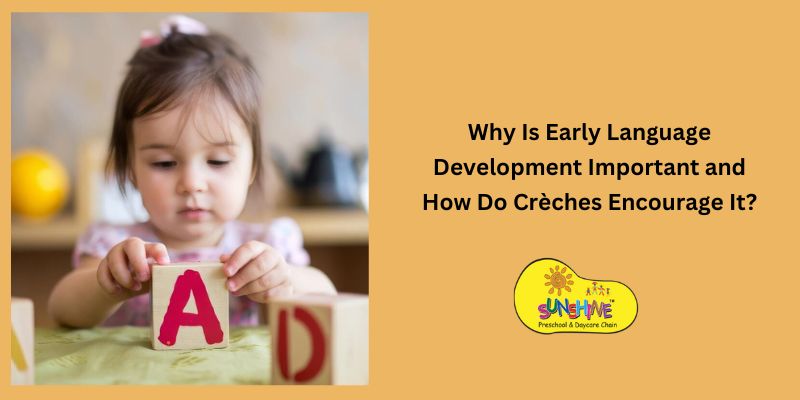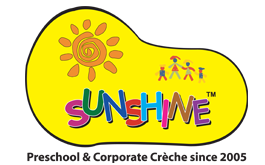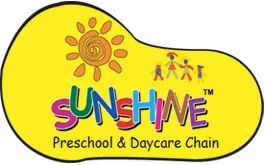Why Is Early Language Development Important and How Do Crèches Encourage It?

Think about the first words a child speaks. For parents, these words are magical, but they are also the building blocks of a child’s development. Early language skills, such as how children listen, understand, and speak, form the foundation for future learning. In fact, research shows that nearly 90% of brain development happens before the age of 5, making these years critical for building communication abilities.
This blog explores the importance of early language development and the vital role crèches play in nurturing children’s language and literacy skills during their formative years.
The Importance of Early Language Development
Language is far more than just words, but the key to a child’s cognitive, emotional, and social growth. When children develop strong language skills early on, they:
- Enter school with a head start in reading and writing.
- Express themselves with confidence.
- Build meaningful relationships with peers and caregivers.
- Develop stronger problem-solving and decision-making abilities.
Studies have shown that children who are read to regularly in their early years know almost 1.4 million more words by the time they start school compared to those who are not. This vocabulary advantage directly translates into stronger comprehension and academic performance.
On the other hand, delays in language development can lead to challenges in school readiness, difficulty understanding instructions, and lower self-esteem. Early intervention and the right environment can make a world of difference.
How Language and Literacy Skills Develop in Early Childhood
Language skills develop gradually, beginning with coos and babbling in infancy, progressing to single words and short phrases, and eventually expanding into complete sentences. Three key factors shape this process:
- Listening and imitation: Children learn words by hearing them repeatedly and attempting to imitate the sounds.
- Interaction: Everyday conversations help children connect words with meaning.
- Exposure: The more words children hear, the stronger their vocabulary and literacy skills become.
For example, a toddler who frequently hears songs and rhymes at home or in a crèche will naturally begin to experiment with sounds and words earlier. Over time, this lays the groundwork for reading and writing skills.
Crucially, there is a direct link between early language development and literacy. Children who grow up surrounded by rich vocabulary and meaningful conversations are more likely to develop confidence as readers and writers later in life.
Why the Crèche Environment Is Ideal for Language Development
Crèches offer much more than safe childcare. They are structured environments designed to support learning through play, interaction, and routine. Some of the ways crèches promote language development include:
- Structured activities: Storytelling, rhymes, and group activities that introduce children to new words and sentence patterns.
- Peer interaction: Playing and talking with other children helps develop conversational skills.
- Trained caregivers: Staff model correct language use and gently encourage children to express themselves.
- Routine exposure: Circle time, reading sessions, and conversations during meals all provide daily opportunities for language growth.
The group setting in a crèche is compelling because children learn from one another. When a child hears a peer use a new word, they are motivated to try it themselves. Similarly, group storytelling or role play allows children to practise taking turns in conversations and expand their vocabulary in context.
Activities at Crèches That Encourage Language Development
Language skills don’t develop in isolation, but they are nurtured through engaging, child-friendly activities that keep learning fun. Standard practices in quality crèches include:
- Storytelling and reading aloud: Builds imagination and vocabulary while introducing children to sentence structures.
- Songs and rhymes: Improve rhythm, memory, and pronunciation playfully.
- Role play and pretend play: Encourage children to use expressive language while acting out real-world scenarios.
- Caregiver conversations: Staff ask open-ended questions, encouraging children to think and respond with more than “yes” or “no.”
- Peer group play: Games and activities help children learn turn-taking, negotiation, and conversation skills.
For instance, a crèche may have a “story corner” where children listen to stories and then retell them in their own words. This not only develops vocabulary but also strengthens memory, sequencing, and confidence in communication.
Many crèches also integrate cultural stories, songs, and festivals into their programs, helping children connect language learning with real-life experiences. These activities give children a sense of identity and belonging while also enriching their vocabulary.
The Role of Parents and Crèches Working Together
While crèches provide daily opportunities for language practice, the role of parents remains vital. Research shows that children progress fastest when parents and caregivers reinforce each other’s efforts.
Some ways parents can extend crèche learning at home include:
- Reading bedtime stories together and asking children to predict what might happen next.
- Encouraging children to talk about their day using descriptive words.
- Singing familiar rhymes and songs at home to reinforce what they learned in the crèche.
- Praise children when they try to use new or complex words.
- Creating a “word-rich” home environment by labelling objects, talking through daily routines, and playing word-based games.
This strong home-crèche partnership ensures that children receive consistent exposure and practice, accelerating their communication and literacy development.
In Conclusion
Early language development is the foundation for lifelong learning. Strong communication skills in the early years lead to improved school performance, increased social confidence, and enhanced emotional well-being. Crèches offer the ideal blend of structured activities, peer interaction, and professional guidance to foster these skills. Unlike informal childcare settings, a quality crèche ensures that every moment, whether it's playtime, mealtime, or storytime, becomes an opportunity to build vocabulary and communication skills.
For working parents, choosing a quality crèche means their child benefits from more than just safe care; it also ensures exposure to the right environment for language development. By supporting language development during these crucial years, crèches help raise confident communicators who are ready to succeed in school and beyond.
Give Your Child the Gift of Strong Communication Skills
At Sunshine Preschool & Corporate Crèche, we believe every child deserves the best start in life. Our centres combine structured learning, interactive play, and caregiver support to nurture early language and literacy skills during the most crucial years of development.
By choosing Sunshine, you’re not only ensuring safe childcare but also investing in your child’s future as a confident communicator. Contact us today to discover how our crèche facilities can support your employees’ families and help children thrive.
FAQs
1. At what age is language development?
The first five years, especially from birth to age 3, are the most critical for developing vocabulary, speech, and communication skills.
2. How do crèches help children with delayed speech?
Crèches provide daily opportunities for conversation, speech-stimulating activities, and encouragement from trained caregivers, creating an ideal environment for children with delayed speech to improve.
3. Why is reading important in early language development?
Reading introduces children to new words and sentence patterns, enhances comprehension, and sparks imagination, laying a foundation for literacy.
4. Can bilingual children benefit from language development in crèches?
Yes. Exposure to multiple languages in a social setting strengthens adaptability, cultural awareness, and communication skills.
5. How can parents support language development at home alongside crèche learning?
Parents can read daily, encourage open conversations, use songs and rhymes, and involve children in everyday discussions to reinforce what they learn at the crèche.
Be the first to post a comment



Leave a Reply Cancel reply